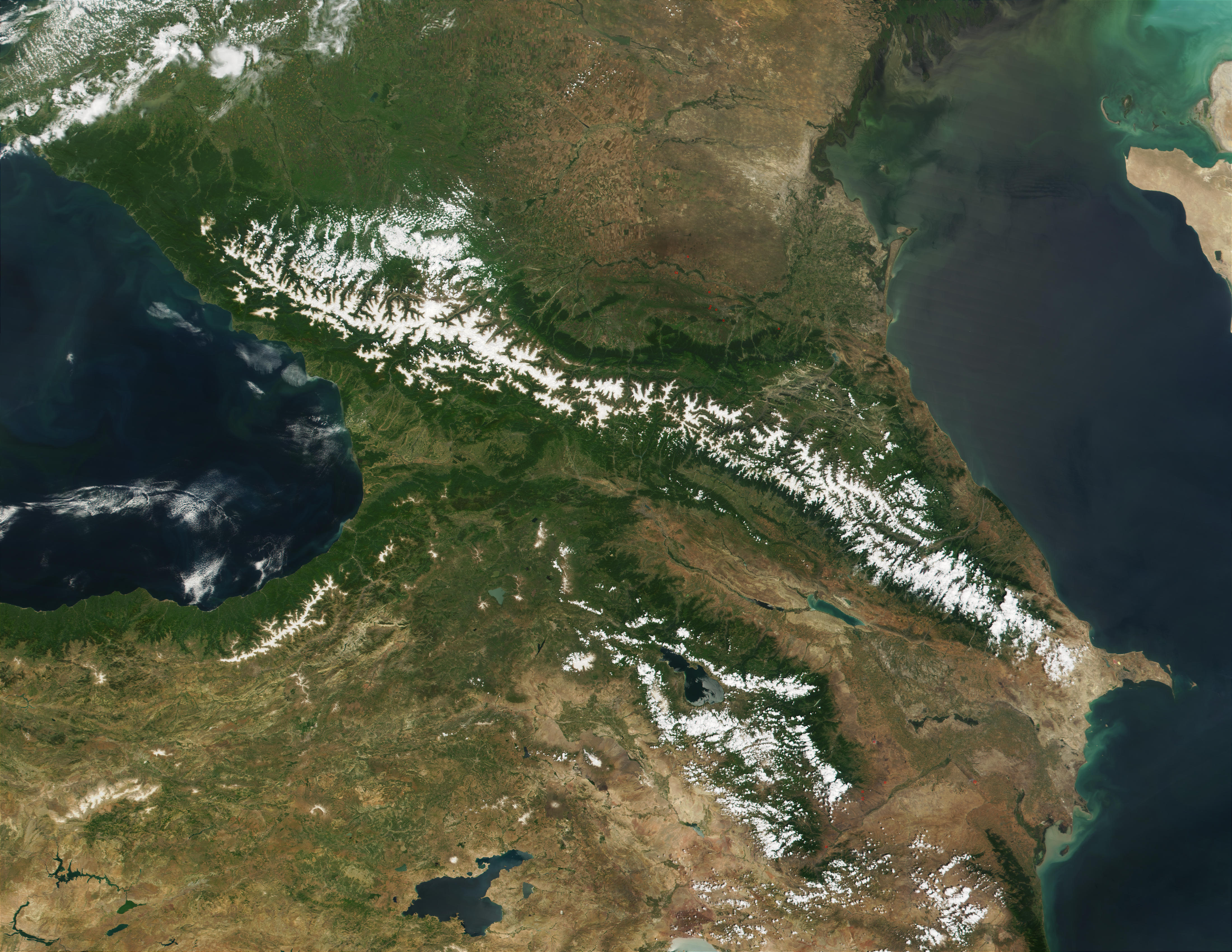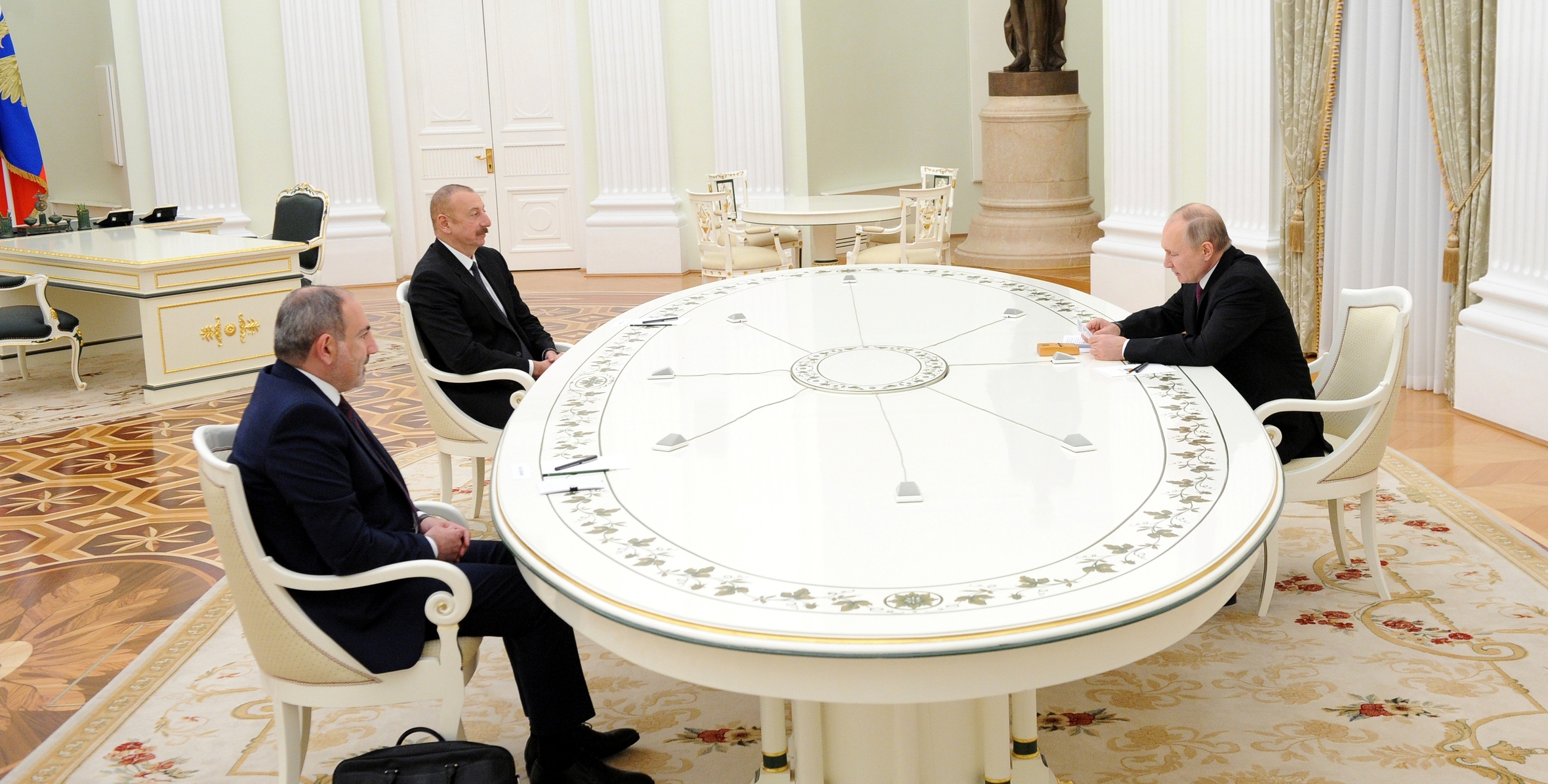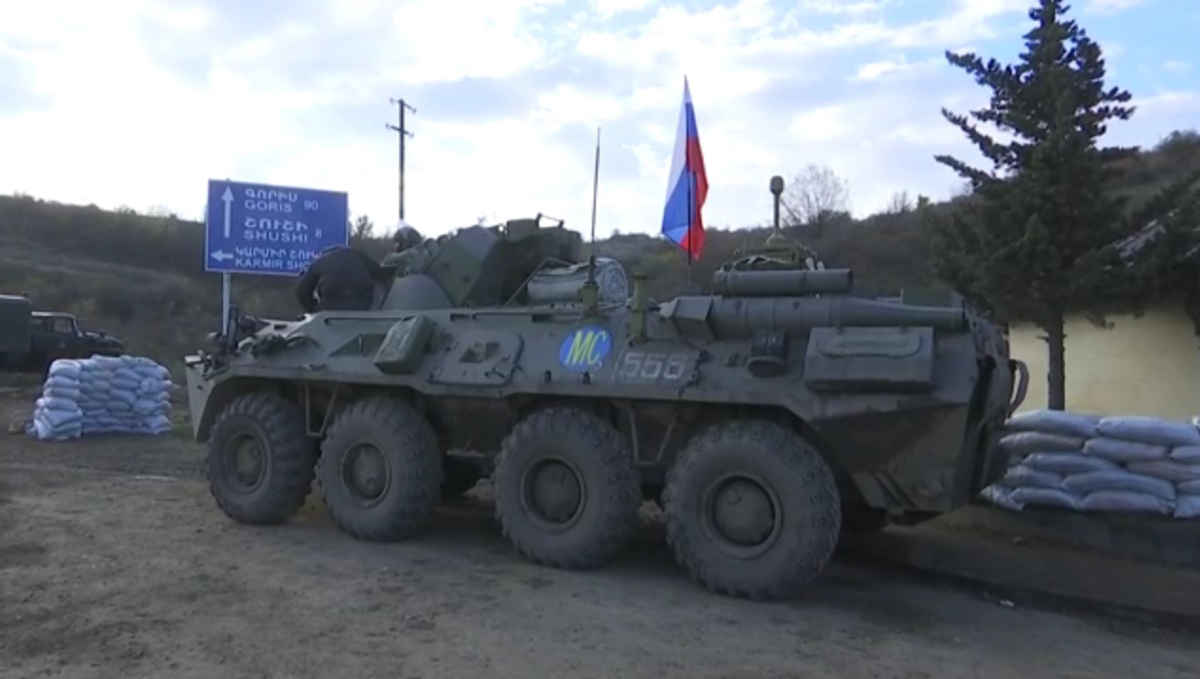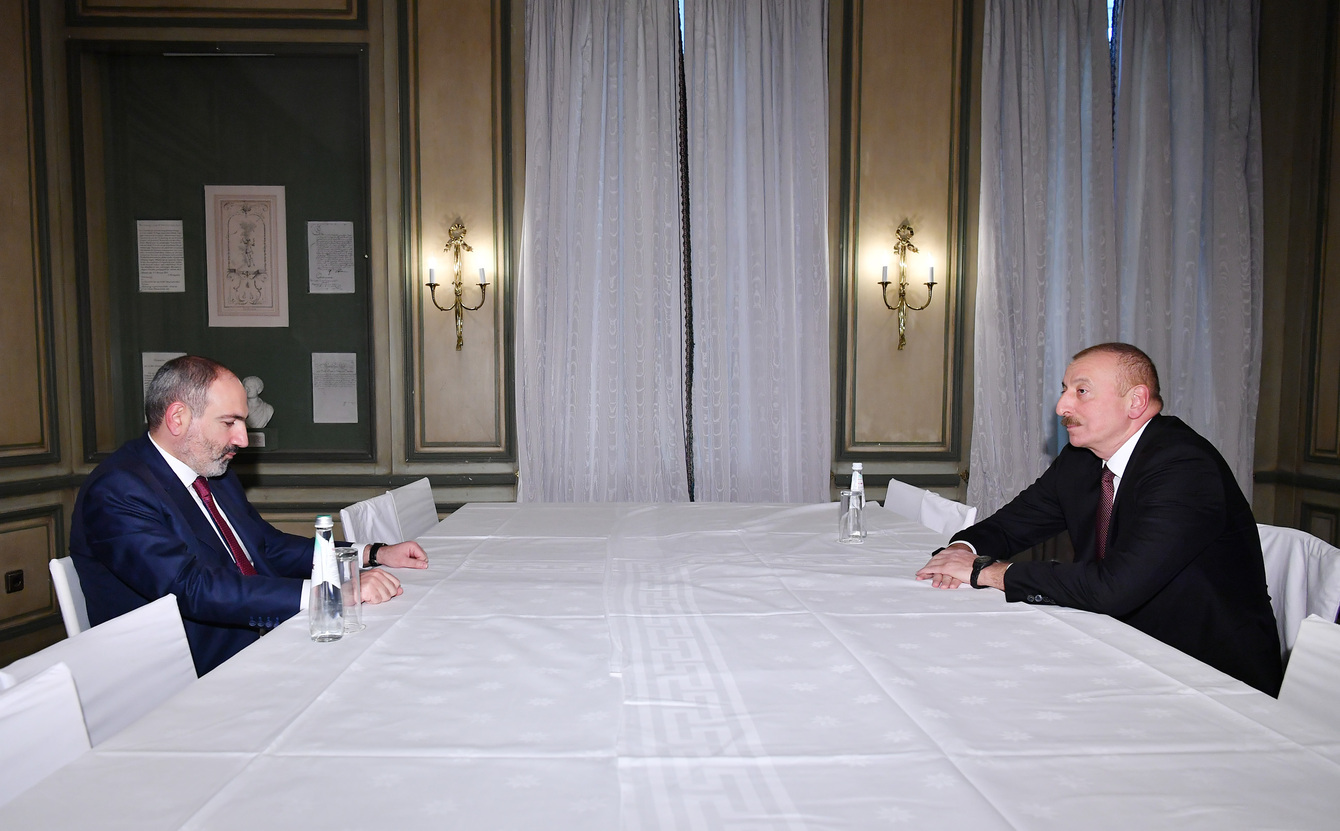SPECIAL REPORTS
Date: 12 March 2021
Author: Jakub Lachert
Nagorno-Karabakh as Part of Geopolitical Rivalry
The year 2020 brought a turning point in the Nagorno-Karabakh conflict. The flare-up in the fighting between the Azerbaijani military and ethnic Armenian forces of the breakaway region resulted in a peace deal that humiliated Armenia that had to return 75 percent of Nagorno-Karabakh to Azerbaijan as well as all transit routes from the disputed enclave to Armenia.
- Many experts saw the peace agreement as a triumph of Russia that mediated in the conflict.
- As the peace treaty imposed new rules, the geopolitical situation shifted in the South Caucasus, from where withdrew Western nations, thus losing their political influence in the region. Turkey now seems to be filling the void left by both the United States and the European Union.
- As the Russian military stepped into the war theater, the Nagorno-Karabakh issue might stall.

It has remained unsolved since the demise of the Soviet Union while sparking tensions in the South Caucasus. The conflict lingered for the past three decades, causing some persistent frictions in the geopolitically fragile spot of the South Caucasus. The fighting that the Azerbaijani military waged between September 27 and November 9, 2020, shifted the geopolitical balance of power, notably building up a strong position of Russia and Turkey as top geopolitical actors throughout the region.

Limited role for the European Union and the United States in the Nagorno-Karabakh mediating process
Western European nations and the United States clearly showed no involvement in the mediating process between the warring parties, a somewhat surprising attitude as both France and the United States co-chair the OSCE Minsk Group, a mechanism created to encourage a peaceful solution to the Nagorno-Karabakh conflict. Their stance is in stark contrast to that adopted during the 2008 Russia-Georgia war when then French President Nicolas Sarkozy was personally involved in mediating a ceasefire on behalf of the European Union as France held the bloc’s presidency at the time.
Perhaps the EU’s approach stemmed from two reasons. Firstly, the Nagorno-Karabakh military offensive broke out as the pandemic rolled across the world while Brussels was wrapping up its trade talks with the United Kingdom. For the European Union, the clash that erupted between Azerbaijan and Armenian-majority Nagorno-Karabakh was not important enough to take action in face of the bloc’s complex internal situation. The second issue – far more embarrassing for the European Union – is that it has no adequate political and economic tools to influence the situation in the South Caucasus. The EU’s cooperation with Armenia and Azerbaijan under the Eastern Partnership resembles a facade. Fearful of dropping Russian military assistance, Armenia abandoned plans to sign the EU Association Agreement in 2014 while the 2017 Armenia-EU Comprehensive and Enhanced Partnership Agreement, or CEPA, is not an alternative to the Moscow-offered schemes bringing together Eurasian partners. The EU-Azerbaijan partnership does not involve solely trade issues. Any efforts to forge political cooperation fail amid the authoritarian system in Azerbaijan.
In the United States, all eyes were back then on the election campaign that ran simultaneously to the Nagorno-Karabakh military offensive, preventing Washington from becoming more involved. The dispute over the enclave is a problem for U.S. diplomacy. The Armenian community of the United States enjoys a strong position in the U.S. Capitol whose members are lobbying for Armenians in both Armenia and Nagorno-Karabakh. At the same time, the United States sells military hardware and weapons to Azerbaijan. In 2019, Washington signed a $10 million worth of military deal with Baku[1]. The United States is offering military aid to Armenia albeit symbolically, compared to other political actors present in the region. The top leading arms suppliers to Azerbaijan are Turkey, Israel, and Russia while Armenia gets weapons essentially from Moscow.
The situation seems complex amid Washington’s geopolitical pursuits throughout the South Caucasus. Russian domination in the region is perilous to U.S. interests. Washington is seeking to keep military and energy partnership with Azerbaijan, a country that once under Moscow’s political control loses its strategic importance for the United States. At the same time, the regional threat to Washington is aligned with the policy followed by Ankara. Formally a NATO member, Turkey is attempting to build its independent position as a regional power capable of influencing the Western Balkans, the South Caucasus, and the Middle East. With the attempt to free these regions from Western impact, Turkey has an intention to forge an alliance and cultural communities with what is known as Turkic countries. Azerbaijan occupies a particular place between them. It can be assumed that Washington has not developed a clear stance on the Nagorno-Karabakh conflict as it cannot grant its full support to either side.

Russia-Turkey regional competition
Both Moscow and Ankara have lively interests in the South Caucasus. Turkey sees it as a top strategic region in areas like politics, economy, and military. Its top ambition is to secure transport corridors running to and from Azerbaijan. Turkey’s huge political influence there may result in a robust alliance, which could in the future expand onto Central Asian nations, thus forming a major political bloc under the Turkish authority. It seems that after Turkey relinquished EU integration efforts, the country needs fresh coalitions that would be easiest to create within the Turkic world.
Azerbaijan’s trumph in the Nagorno-Karabakh war does not mean the country’s recapturing the whole region. Nonetheless, as part of peace deals, Baku secured a land route running through Armenia and being a direct link with its exclave of Nakhchivan and an indirect one with Turkey. It is thus planned to build a railway connection through Armenia[2]. Compared to the Baku-Tbilisi-Kars railway, which connects Azerbaijan to Turkey via Georgia, the road within the new corridor will be about 340 kilometers shorter. This would foster trade ties between Azerbaijan and Turkey, being beneficial for both nations, although the project is politically costly. Russia will ensure the security of the corridor as the country guarantees the maintaining of communication links between Azerbaijan and Nakhichevan, and between other Armenian-controlled territories in Nagorno-Karabakh and Armenia proper. Before Azerbaijan’s latest military offensive, Armenia had remained in possession of the Lachin corridor, a narrow strip providing a pathway between Armenia and the enclave of Nagorno-Karabakh. After the 2020 flare-up, Armenia lost the connection, while the Russian military will guard the route from now on.
Support Us
If content prepared by Warsaw Institute team is useful for you, please support our actions. Donations from private persons are necessary for the continuation of our mission.
Turkey, which supports Azerbaijan politically, is trying to put Baku’s victory into a more robust position in the South Caucasus. With the above, it can be assumed that Turkey will serve a decisive role in the region. However, Russia is the biggest winner in the Nagorno-Karabakh dispute as the country has at its disposal all the necessary political instruments to remain the top decisive political actor. That stems from Moscow’s strategic approach to the conflict. Russia, which was committed to shielding only the territorial integrity of the Republic of Armenia, did not need to dispatch its troops to Nagorno-Karabakh as the exclave had just its military forces to defend. In consequence, Moscow could mediate in the conflict that might have been a considerable challenge for it, especially with Azerbaijan’s cutting-edge military equipment. Besides, this attitude may have resulted from Armenia’s decision not to send its troops to the exclave since the country’s officials feared that the military theater would then shift onto the territory of the Republic of Armenia.

Moscow saw the defeat of the Armenian military in Nagorno-Karabakh as beneficial as this enfeebled the position of Nikol Pashinyan – the Armenian prime minister who sought to get politically closer to the West and did not secure the full support of the Kremlin. Besides, casting Russia into the role of the top mediator has strengthened its position locally. Under the peace deal, Russian troops are now also in Azerbaijan to observe the ceasefire. For the Kremlin, the dispute boosted Russia’s position also towards Azerbaijan. Having won the latest war, Baku agreed to welcome Russian peacemakers in Nagorno-Karabakh since only they could bring relative stability to the volatile region. This gave rise to a certain paradoxical situation as foreign troops are stationed in the country that won. Thus, Russia is stretching its influence across the South Caucasus. Moscow has had few tools of political pressure on Baku until now. In a new geopolitical reality, keeping transit routes between Azerbaijan and Turkey and restoring stability to Nagorno-Karabakh will depend largely on Russian “peacemakers.” A total of 1,960 peacekeepers, 90 armored personnel carriers, and 380 vehicles and pieces of special equipment will be sent to Nagorno-Karabakh, the Russian news agency TASS wrote in an article[3]. The Russian peacekeepers will be deployed to the region for five years but this term may be automatically extended for additional five-year periods, if necessary, according to the peace deal.
A crucial part of Russian and Turkish influence in the South Caucasus is the impact they both exert on some nations in the region. Regardless of its domestic affairs, Armenia will continue to rely on Russia. With Armenia’s complex international policy, the Pashinyan government adopted the most pro-Western stance of all the country’s political groups. Once the popularity rating of the Armenian prime minister dropped amid an unfavorable peace deal and the political turmoil that followed his country’s defeat in Nagorno-Karabakh, there will be two possible solutions: either a new Moscow-friendly government will be formed or Pashinyan will himself seek support in the Kremlin. Azerbaijan, in turn, is leveraging its leading position in the South Caucasus through an alliance with Turkey as the latter country is attempting to set the foot in the region, also by sending troops to Azerbaijan to monitor the ceasefire. On January 30, 2021, Russia and Turkey opened a joint center to observe a ceasefire in Nagorno-Karabakh. It will be staffed by up to 60 servicemen each from Turkey and Russia. They are tasked with monitoring the ceasefire by using unmanned vehicles while Turkey has no mandate allowing it to do so in Nagorno-Karabakh.

Possible scenarios for Nagorno-Karabakh – a geopolitical perspective
Probably in the future there will be some attempts to freeze the Nagorno-Karabakh conflict. The Russian military will seek to keep the peace deal in force as only in this way Moscow would guarantee full control of the region. In case of more strains, Azerbaijan would possibly recapture the whole territory, a situation that results in Baku’s freeing from Russian influence and a cemented military alliance with Turkey.
Ankara is likely to fill the void Western nations left in the Nagorno-Karabakh peace process that will thus narrow down to rivalry between Turkey and Russia as two dominant powers regionwide.
The Nagorno-Karabakh war also affects neighboring nations, notably Iran, whose borders saw the fighting last fall. Although Tehran has in the past displayed no initiative to mediate between the two countries, it repeatedly warned that renewed strains might bring escalation. The 82-million country is inhabited by some 100,000 ethnic Armenians and roughly 15 million Azerbaijanis. The mostly-Muslim Azerbaijanis, who form a populous ethnic group in Iran, are far more influential there than the Armenians, whose members live in Iran in a closed community. Nonetheless, Tehran shapes its geopolitical ties with the two nations differently. Christian-majority Armenia enjoys friendly relations with neighboring Iran that offers a visa-free regime for its citizens. As Armenia had its borders closed with Azerbaijan and Turkey, Iran was its only remaining trade partner only to Georgia. Both countries have no territorial claims against each other. There were some skirmishes between Azerbaijan and Iran amid West Azerbaijan Province, a northern province of Iran, whose mostly-Azerbaijani inhabitants find it challenging to assimilate into Iranian society. Another impediment to cooperation between these two is the U.S.-Israel-Azerbaijan military partnership, which is something Tehran cannot accept. What seems is that Iran will observe both the Nagorno-Karabakh dispute and geopolitical shifts throughout the region, but without involving militarily, politically, or economically.
NEWSLETTER
Georgia is another country being indirectly entangled in the clash. As the past thirty years saw frozen ties between Armenia on the one hand and Azerbaijan and Turkey on the other, Georgia won a chance to become a transit country for the warring nations. All energy routes linking Azerbaijan and Turkey have so far run through the territory of Georgia. As energy commodities are of top strategic importance, perhaps Baku will not build new pipelines running through Armenia, a country hostile to the strategic interests of Azerbaijan. Possibly new transport routes will not exclude the role of Georgia as a transit country; in case of strategic competition between Ankara and Moscow, Azerbaijan will probably not align its trade with Turkey with Russian-controlled transport routes. At the same time, Azerbaijan could use the Nakhchivan corridor for local transport, so far carried out exclusively by air connections. However, the most vital shifts for Tbilisi are geopolitical. The top threat to Georgia is the Western withdrawal from a political dialogue in the hotspots across the region, a somewhat remarkable step after the 2008 Russia-Georgia war. If a domestic conflict breaks out in Georgia – inspired by either Russia or Turkey, for instance in the Muslim-populated Adjara province – Western nations could do nothing but to condemn a military offensive. Russian and Turkish domination across the region also hinders Tbilisi’s appetite for EU integration since Georgia is the only South Caucasus country showing aspirations for membership in the bloc. Both Ankara and Moscow will make efforts to curb EU and U.S. influence across the region.

Conclusions
It is difficult to calculate the human toll of the Nagorno-Karabakh conflict as the number of casualties as detailed by Armenia and Azerbaijan was not confirmed by any data from international institutions. Azerbaijan said 2,783 of its forces died in the Nagorno-Karabakh war. In early December 2020, Armenia announced its death toll at 2,317 people while in January 2021, the country raised the tally to 3,330 upon properly identifying casualties. However, people in Armenia and members of the ethnic Armenian population in Nagorno-Karabakh remain skeptical about the toll, arguing that the government in Yerevan is trying to hide the actual scale of the defeat.
The Nagorno-Karabakh conundrum is viewed mostly through the geopolitical prism. Sandwiched between Russia, Iran, and Turkey, the South Caucasus might in the future become an important transport hub for emerging Asian superpowers. The only certain part of the “geopolitical puzzle” is that Turkey grows in importance there while Russia maintains its dominant position. Moscow still holds the lead in the region, or its sphere of influence, thus the current solution to the Nagorno-Karabakh dispute cannot come as a territorial gain for Moscow, but as keeping the Russian grip on the post-Soviet areas.
Author: Jakub Lachert
Jakub Lachert is a PhD candidate at the Faculty of Political Science and International Studies at the University of Warsaw. His research interests include the EU’s neighborhood policy, in particular the bloc’s Eastern policy, the Eastern Partnership, and the EU integration of the Western Balkans.
[1]https://defence24.pl/amerykanskie-sankcje-dla-azerbejdzanu-i-turcji
[2]https://www.euractiv.com/section/azerbaijan/opinion/the-nakhchivan-corridor-will-boost-connectivity-in-caucasus/
[3]https://tass.ru/politika/9984415
All texts published by the Warsaw Institute Foundation may be disseminated on the condition that their origin is credited. Images may not be used without permission.

















